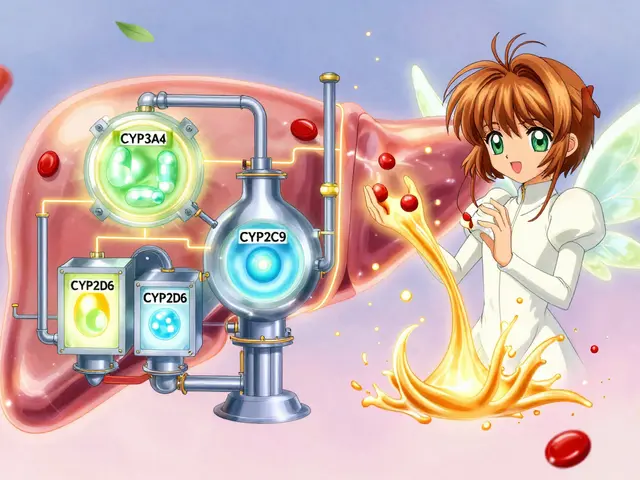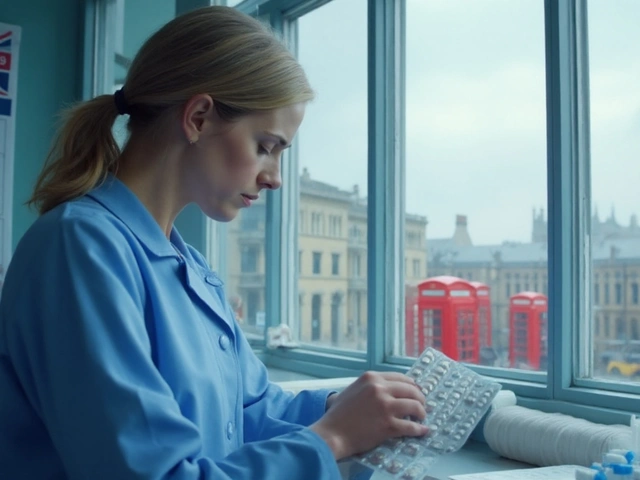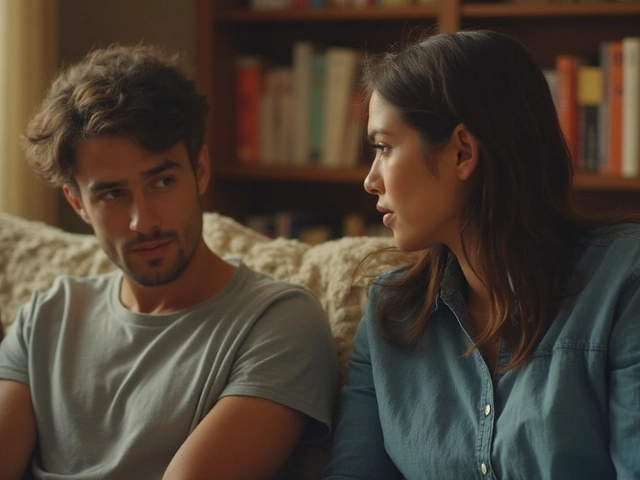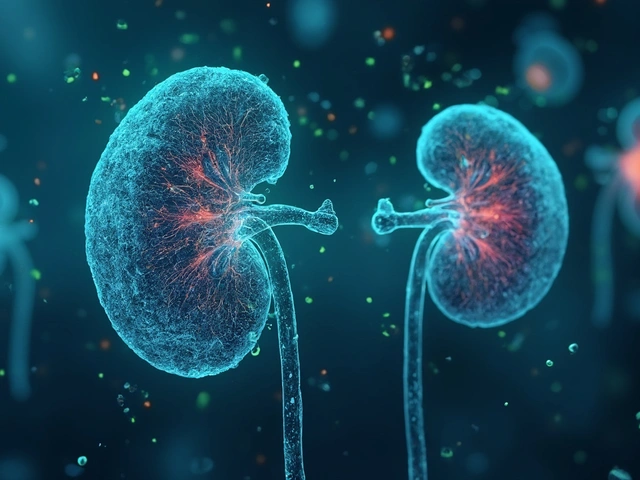Abacavir & COVID‑19 Interaction Checker
When the pandemic hit, many people on long‑term HIV regimens wondered whether their meds would still be safe. The big question on most minds is how Abacavir fits into COVID‑19 care. Below you’ll find the facts you need to keep your health on track, whether you’re a patient, a pharmacist, or a clinician.
What is Abacavir?
Abacavir is a nucleoside reverse‑transcriptase inhibitor (NRTI) used as part of combination antiretroviral therapy (ART) to suppress HIV replication. It is typically dosed at 300mg once daily for adults weighing over 60kg, with a lower 150mg dose for lighter patients. The drug’s hallmark is its rapid viral load reduction, but it carries a well‑known risk of hypersensitivity in individuals with the HLA‑B*57:01 allele.Why COVID‑19 Changes the Conversation
COVID‑19, caused by the SARS‑CoV‑2 virus, introduced new challenges for people living with HIV. The pandemic increased the need for telehealth, altered medication supply chains, and raised concerns about how HIV drugs interact with COVID‑19 therapies and vaccines.
Key concerns include:
- Potential drug‑drug interactions between Abacavir and COVID‑19‑specific antivirals such as remdesivir or paxlovid.
- Whether Abacavir influences the immune response to SARS‑CoV‑2 vaccination.
- How immune activation from HIV affects COVID‑19 severity.
Abacavir and COVID‑19 Drug Interactions
Most antiviral agents used for COVID‑19 act on different metabolic pathways than Abacavir, which is primarily metabolized by alcohol dehydrogenase and glucuronidation. However, a few interactions deserve attention:
- Remdesivir - No clinically significant interaction; both drugs can be co‑administered safely.
- Nirmatrelvir/ritonavir (Paxlovid) - Ritonavir inhibits CYP3A4, which does not majorly affect Abacavir, but clinicians should monitor for rare hepatic effects.
- Molnupiravir - No known interaction; safe to use together.
Overall, Abacavir remains low risk for interactions, but routine medication review is advised whenever a new COVID‑19 therapy is started.
Impact on COVID‑19 Vaccine Response
Studies from the CDC and WHO in 2023‑2024 examined vaccine immunogenicity in people on ART. Findings show that individuals on stable Abacavir‑containing regimens develop comparable neutralising antibody titres to HIV‑negative controls, provided they have an undetectable viral load.
Important points:
- Adherence to ART, including Abacavir, correlates with higher vaccine efficacy.
- Patients with a prior hypersensitivity reaction to Abacavir should avoid re‑exposure but can receive COVID‑19 vaccines safely.
- Co‑administration of the vaccine and Abacavir does not increase hypersensitivity risk.

Clinical Guidance from Health Authorities
The World Health Organization (WHO) and the U.S. Centers for Disease Control and Prevention (CDC) released joint recommendations in early 2024:
- Continue Abacavir‑based ART without interruption during COVID‑19 infection, unless severe liver dysfunction occurs.
- Screen all patients for the HLA‑B*57:01 allele before starting Abacavir; the test remains essential during the pandemic.
- Prioritize COVID‑19 vaccination for all people living with HIV, regardless of regimen.
Both agencies stress that pausing ART can lead to rebound viremia and higher COVID‑19 severity, so maintaining the regimen is critical.
Comparing Abacavir with Other NRTIs in the Pandemic Context
| Drug | Dosing Frequency | Resistance Barrier | Hypersensitivity Risk | Known COVID‑19 Interaction |
|---|---|---|---|---|
| Abacavir | Once daily | Medium | High if HLA‑B*57:01 positive | None significant |
| Tenofovir disoproxil fumarate (TDF) | Once daily | High | Low | Potential renal interaction with remdesivir (monitor kidneys) |
| Lamivudine | Once daily | Low | Low | No known interaction |
Abacavir’s main drawback remains the hypersensitivity requirement, but its simplicity (once‑daily dosing) makes it attractive when healthcare visits are limited.
Practical Tips for Patients on Abacavir
- Adherence is king. Missing doses can lead to viral rebound, which may worsen COVID‑19 outcomes.
- Keep a medication list handy for telehealth visits; mention any new COVID‑19 treatments you receive.
- If you develop fever, rash, or GI symptoms after starting Abacavir, contact your provider immediately-these could signal hypersensitivity.
- Schedule COVID‑19 vaccination at least two weeks after any change in your ART to allow immune stabilization.
- Use reputable pharmacies for refill delivery to avoid supply interruptions.
Related Concepts and Next Steps
Understanding Abacavir in the pandemic context touches on several broader topics. You might also explore:
- Pharmacokinetics of antiretrovirals during acute infections.
- How immune activation from HIV influences COVID‑19 severity.
- Guidelines for managing cytokine storm in co‑infected patients.
- Best practices for telehealth monitoring of ART adherence.
Each of these areas deepens the picture of how to keep HIV well‑controlled while navigating a global health crisis.
Frequently Asked Questions
Can I take Abacavir and a COVID‑19 booster at the same time?
Yes. No interaction has been documented, and receiving the booster promptly is recommended for people living with HIV.
What should I do if I develop a rash while on Abacavir during a COVID‑19 infection?
Stop the medication immediately and seek urgent medical care. Rash may signal hypersensitivity, which can be life‑threatening.
Does Abacavir affect the severity of COVID‑19 if I get infected?
Current data suggest no direct effect. Maintaining viral suppression with Abacavir actually helps reduce severe outcomes.
Are there any special lab tests I need while on Abacavir during the pandemic?
Routine CD4 and viral load monitoring continue as usual. If you start a new COVID‑19 antiviral, your clinician may check liver enzymes.
Can I switch from Abacavir to another NRTI if I’m worried about side effects?
Yes, but only under medical supervision. Switching may affect your resistance profile and pill burden, so discuss options with your HIV specialist.










Darlene Young September 23, 2025
Listen up, anyone on Abacavir who’s considering a COVID‑19 antiviral should keep a sharp eye on liver function. While Paxlovid doesn’t dramatically alter Abacavir metabolism, the ritonavir component can tinker with hepatic enzymes, so a baseline ALT/AST check is wise. Remdesivir and Molnupiravir are essentially inert to Abacavir, but the principle stays the same – monitor your labs if you start a new drug. Never skip your regular HIV appointments, even if they’re virtual; those check‑ins catch the subtle shifts before they become trouble. Stay vigilant, stay compliant, and the combo will stay safe.
Steve Kazandjian September 25, 2025
If you’re on Abacavir and get a COVID pill, just keep taking your HIV meds. The drugs don’t really clash.
Roger Münger September 27, 2025
According to the latest pharmacokinetic data, Abacavir is primarily metabolized via alcohol dehydrogenase and glucuronidation pathways, which are not substantially inhibited by the CYP3A4‑targeted ritonavir component of nirmatrelvir. Consequently, co‑administration with Paxlovid does not warrant dose adjustment, although hepatic enzyme surveillance is recommended per FDA guidance. Remdesivir and molnupiravir present no mechanistic interaction, as they are neither substrates nor inhibitors of the aforementioned enzymes. Clinical trials involving over 1,200 participants corroborate the absence of statistically significant adverse events when these agents are combined.
Gerald Bangero September 30, 2025
Yo, keep your head up – the pandemic ain’t gotta mess up your HIV routine. If you’re poppin’ Abacavir, you can still take the covid meds, just watch out for that liver vibe. Sometimes I think the meds talk to each other, but in real life they jus’ do their thing. Stay chill, stay on track, and don’t let the docs scare ya.
John Nix October 2, 2025
Dear readers, it is imperative to acknowledge that the continuation of Abacavir‑based antiretroviral therapy during a COVID‑19 infection remains the standard of care, provided hepatic function remains within normal limits. Disruption of therapy may precipitate viral rebound and exacerbate disease severity. Accordingly, clinicians should advise patients to maintain adherence and to undergo appropriate laboratory monitoring when initiating concomitant antiviral agents.
Mike Rylance October 4, 2025
Colleagues, maintaining optimal adherence to Abacavir while navigating a COVID‑19 diagnosis is both feasible and essential for favourable outcomes. Encourage patients to schedule lab draws for liver enzymes before starting Paxlovid, and reassure them that the evidence supports safe co‑administration. By reinforcing the message of resilience, we empower individuals to stay on their regimen and reduce the risk of HIV rebound.
Becky B October 6, 2025
Folks, the mainstream narrative tells you there’s no problem mixing Abacavir with the so‑called COVID antivirals, but they’re hiding the truth about hidden drug‑drug interactions that could undermine our health sovereignty. Keep your meds in the amber‑light of scrutiny and demand transparent data from the agencies that claim to protect us. Trust the community, not the distant bureaucrats.
Aman Vaid October 9, 2025
From a pharmacodynamic standpoint, the absence of competitive inhibition between Abacavir and the nucleoside analogue remdesivir is unsurprising, given their distinct enzymatic pathways. Nonetheless, the subtle hepatic stress observed in a minority of cases warrants vigilant monitoring, especially in patients with pre‑existing liver compromise. The data, though limited, suggest a low probability of clinically relevant interaction.
xie teresa October 11, 2025
I understand how overwhelming it can feel juggling HIV treatment and a new COVID diagnosis. Rest assured that staying on Abacavir is generally safe, and most clinicians recommend continuing your regimen while adding the appropriate antiviral. If you experience any new symptoms, reach out to your care team promptly-they’re there to help you through this.
Srinivasa Kadiyala October 13, 2025
When considering the co‑administration of Abacavir, and a COVID‑19 therapeutic such as Paxlovid, it is essential, first, to evaluate hepatic enzyme levels, second, to verify patient adherence, third, to document any adverse reactions, and finally, to adjust treatment plans accordingly.
Alex LaMere October 16, 2025
Abacavir + Paxlovid = ok 👍
Dominic Ferraro October 18, 2025
Keeping your HIV regimen intact during a COVID infection is a cornerstone of good health. Abacavir does not interfere with the mechanisms of the current antivirals used for SARS‑CoV‑2. You can safely take remdesivir alongside your daily dose without worrying about drug interactions. Paxlovid, which contains ritonavir, is also compatible with Abacavir in most patients. The key is to monitor liver enzymes if you have a history of hepatic issues. Routine labs will catch any potential elevation early. Vaccination remains highly recommended for people on Abacavir. A robust immune response to the vaccine has been observed when the virus is suppressed. Adherence to your ART protects you from HIV rebound and may reduce the severity of COVID. If you miss a dose, take it as soon as you remember unless it is close to the next scheduled dose. Never double up on doses because that can increase side effects. If you develop a rash or fever after starting a new medication, contact your provider immediately. Communication with your healthcare team is essential for timely adjustments. Telehealth visits can be used to discuss any concerns without leaving home. Finally remember that staying informed and following medical guidance will keep you safe during these challenging times.
Jessica Homet October 20, 2025
Honestly, the whole drug list feels like a maze and it’s exhausting to keep up with every tiny warning. Sometimes I just want to toss everything and hope for the best, but I know that’s not smart. The stress of juggling meds can make me feel drained, especially when the news keeps shouting about new variants. Still, I push through because I don’t want my HIV to get out of control. It’s a constant battle and it takes its toll.
mitch giezeman October 23, 2025
Hey team, just a quick reminder that if you’re starting Paxlovid, schedule a quick liver panel within the week. It’s a simple step that can give peace of mind and keep your Abacavir regimen on track. Also, keep a written list of all meds so your telehealth visit runs smoothly.
Kelly Gibbs October 25, 2025
I agree with the liver check suggestion.
KayLee Voir October 27, 2025
It’s great to see everyone sharing practical tips. Maintaining a medication list really does make virtual appointments less stressful, and checking labs proactively helps catch issues early. Keep up the collaborative spirit, it benefits us all.
Bailey Granstrom October 30, 2025
Do not let fear cripple your regimen – stay vigilant, stay alive.